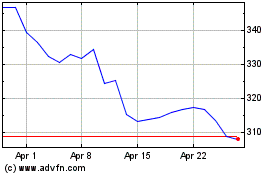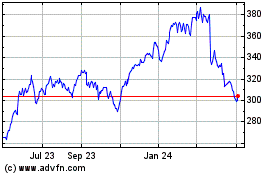By Alexandra Bruell
This article is being republished as part of our daily
reproduction of WSJ.com articles that also appeared in the U.S.
print edition of The Wall Street Journal (June 18, 2019).
Accenture LLC's acquisition of hot creative agency Droga5
earlier this year was just the latest and most dramatic salvo in
consulting firms' steady encroachment into marketing services.
Accenture, Deloitte LLP and PricewaterhouseCoopers LLP for years
have been investing in marketing services, acquiring ad agencies
and hiring executives in droves in a bid to add some of the $70
billion-plus advertising-agency business to their established
professional-services revenue.
These investments come as marketers are under pressure to
modernize their operations and rethink the way they interact with
today's consumers, a task that requires business and strategy
support that goes beyond traditional advertising.
"We believe the marketers' agenda has been evolving to focusing
on creating superior experiences," says Tom Puthiyamadam, digital
services leader at PwC. "That's the business we built and continue
to invest in."
The pitch is resonating with some marketers.
Deloitte, Accenture and PwC have all seen exponential growth in
the groups that house their marketing services. At Accenture
Interactive, revenue has ballooned to $8.5 billion in 2018 from
$1.9 billion in 2014, according to the company, which has acquired
a number of creative shops, including Fjord and Karmarama as well
as Droga5.
PwC Digital, meanwhile, says its revenue has jumped to $5.4
billion in 2018 from $737 million in 2014, in part from
acquisitions including Pond, Outbox Group and BGT Partners.
And Deloitte Digital had $16 billion in revenue in 2018, up from
$6 billion in 2014.
Revenue in these groups is not necessarily comparable to revenue
at a traditional ad-agency holding company, because the business
units also include products and services that aren't tied directly
to traditional marketing.
To get a better idea how marketers are using the new services
offered by consulting firms, consider the experience of Aspen
Dental Management Inc. In 2017, before it switched to a new agency,
the company ran an ad in which a dentist foils a bank robbery but
provokes even greater financial fear in the teller and bank
customers. The dentist wins everyone over only when he says Aspen
Dental offers low prices.
The ad, created by storied creative agency Crispin Porter &
Bogusky LLC, was meant to help Aspen Dental's hundreds of offices
recruit new dentists and attract new patients as it continues to
expand across the U.S.
But Aspen Dental's new marketing chief, William Setliff, wasn't
pleased with the ad or the results. Using humor to paint a picture
of an industry that gouges patients was "tone deaf," Mr. Setliff
says.
Crispin, which resigned the business in early 2018, declines to
comment.
Deloitte's core consulting group did an analysis that showed
patients would respond well to empathy, and a team from
Deloitte-owned Heat joined the effort to create a more emotive
campaign featuring patient testimonials.
The pitch resonated at Aspen Dental. "We needed to modernize our
approach to marketing," says Mr. Setliff. "We needed a broader view
to make decisions, from advertising to store design."
The company has seen a significant boost in new patient
appointments and a 16% increase in revenue this year up to early
June, compared with the same period last year.
The new structure with Deloitte is 5% to 8% more expensive for
Aspen Dental than working with an agency and consulting firm
separately, says Mr. Setliff. But it's worth it, he says.
Scenes like this are playing out across marketing. Accenture
Interactive has handled marketing work for clients such as Subway
and Carnival Corp., while PwC Digital has designed a new
application to crowdsource donations for the Make-A-Wish
Foundation.
The picture emerging strongly suggests that consultancies that
buy ad agencies can do what the big agencies do, and then some --
at least, that's the promise -- thanks to broad consulting and
technology resources, and the relationships with the CEOs and
CFOs.
The model is far from perfect, however. The consulting firms are
still struggling to win over some marketers. And firms that have
grown quickly, sometimes as a result of acquiring creative shops,
are struggling to bring together contrasting cultures of
advertising and consulting. They are not always in tune with
advertisers' needs.
Consulting firms pursuing advertising and marketing business
"don't know quite how to position themselves as an agency
resource," says Tom Denford, partner at ID Comms Inc., an
agency-search consulting firm. Mr. Denford helped Puma with its
agency review.
Hermann Hassenstein, head of marketing planning at Puma, tells a
story that reflects how consulting firms trying to break into the
ad business can still sometimes be perceived by prospective clients
as out of their depth. When Puma reviewed its global
media-planning-and-buying business last spring, he says, a mix of
companies were invited to compete for the account. Invitees
included large media-buying firms owned by advertising holding
companies, and more integrated marketing shops with media
capabilities.
A large international consulting firm's team arrived at Puma's
Boston office wearing suits and Puma shoes and proceeded to give a
long presentation about "digital transformation," Mr. Hassenstein
says. The presentation looked very similar to one the consulting
firm had given previously to another business unit within Puma, he
adds.
"There were 80 slides full of prophecies and bubbles," Mr.
Hassenstein says. "I was confused, and it was a very deterring
experience."
By contrast, he says, most of the agency executives who met with
Puma wore more casual attire. They assured the company they could
handle the job, be it developing a content strategy, building a
data plan or handling brand and performance marketing, he says.
Puma ultimately hired Havas Media, an agency that was more relaxed
in its presentation and helped provide a data and media offering in
line with Puma's needs, Mr. Hassenstein says.
But one big factor that helps the consulting firms is their
relationships with business leaders such as CEOs and CFOs. Through
these contacts, they have gotten to know marketers newly assigned
to such important and challenging tasks as unifying a brand
presence in stores and online, for example, or building
digital-loyalty programs and using data from those programs to
rethink their marketing mix. These types of issues, involving
technology and data, play to the consulting firms' strengths.
"We've had pressures from other parts of the [corporate]
enterprise to look at Deloitte for marketing," says Greg Paull,
principal at agency-search consulting firm R3. "That's going to be
a common trend."
Ms. Bruell is a reporter for The Wall Street Journal in New
York. Email her at alexandra.bruell@wsj.com.
(END) Dow Jones Newswires
June 18, 2019 02:47 ET (06:47 GMT)
Copyright (c) 2019 Dow Jones & Company, Inc.
Accenture (NYSE:ACN)
Historical Stock Chart
From Mar 2024 to Apr 2024

Accenture (NYSE:ACN)
Historical Stock Chart
From Apr 2023 to Apr 2024
